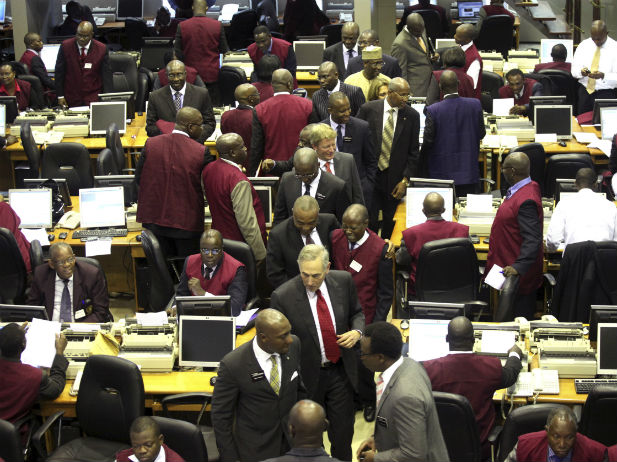- Stocks: Analysts Predict Bearish Trading This Week
The Nigerian equities market is expected to see more of bearish trading this week despite the negative trend that pervaded the market last week.
Sell pressures prevailed in the market last week as investors began profit taking activities on stocks that have been trading at high prices following the recent bullish run.
“We expect trading activities in the coming week to mirror that of the week past albeit at a moderated level. A positive close is not unexpected as we envisage pockets of bargain-hunting in the week following this week’s significant loss,” analysts at Meristem Securities Limited said.
Following weeks of consecutive gains in the Nigerian Stock Exchange, the Exchange’s All-Share index declined significantly by 4.99 per cent, to settle the year-to-date return at 19.53 per cent last week.
Also, volume traded and market turnover declined by 15.53 per cent and 23.30 per cent, respectively. Neimeth International Pharmaceuticals Plc emerged the top performer last week, after the counter advanced by 44.12 per cent to close at N0.98. Contrarily, Transnational Corporation of Nigeria Plc was the top underperformer during the week after it shed 23.12 per cent.
For the banking sector, in what was a negative week for the market in general, there were severe profit taking activities on all, but one of the sector’s counters. “We expect the sector to close in line with the general market mood this week,” the Meristem analysts said.
In the week, as expected, the agric sector halted its gaining streak following the sell pressure on Okomu Oil Palm Plc, which resulted in a week-on-week loss. The analysts envisaged continued sell sentiments this week as investors take profit on the sector major players, having recorded significant gains in the past weeks.
The consumer goods sector recorded continued sell pressures on stocks which had recorded significant gains in the past weeks. This week, it is expected that the sector’s performance would in line with general market sentiments.
After weeks of closing in the green zone, profit-taking activities dominated the health sector stocks last week. However, trickles of bargain-hunting were witnessed among the less popular counters in the sector. Given the recent market mood, the analysts did not rule out a continuation of these buy pressures. Nonetheless, speculators may cash in on the gains recorded due to the companies’ weak fundamentals.
For the industrial goods sector, the Meristem analysts said despite the positive sentiments in the sector evidenced by the market breadth, it closed underwater. “We attribute this loss to the share price decline of the sector’s heavyweights (Dangote Cement Plc and Lafarge Africa Plc). We expect the profit taking to continue this week,” they added.
Mixed sentiments were witnessed in the insurance sector last week as indicated by the sector’s breadth, and according to analysts, the sector’s activities this week would be largely dictated by the general market mood.
For the oil and gas sector, they stated, “We attribute the loss last week to the decline in the share prices of the sector’s heavyweights. We also note the positive sentiments towards Conoil Plc following the release of impressive results alongside dividend declaration in the week. This week, we expect the sector to close positive.
Activities in the services sector mirrored the general market last week as profit taking on a lot of counters prevailed. This week, analysts expect the performance of the sector to remain in line with the market.
Commenting on the this week’s market expectations, analyst at Vetiva Capital Management Limited said, “Given the sustained negative market sentiment at last week’s close – indicated by the widely negative market breadth on Friday and through the week – we expect bearish trading to extend into this week.
For the fixed income market, barring any aggressive mop ups by the Central Bank of Nigeria, the Vetiva analysts foresee increased demand in the Treasury bills market, spurred by the Federation Account Allocation Committee injection and the anticipated N236bn Open Market Operation maturity this week, though the bond space should remain mixed.
The bond market opened last week on a slightly bearish note, with selloffs observed on select tenors even as trading activity in the space remained relatively muted. The bearish sentiment persisted till midweek when the monthly bond auction was conducted.
At the auction, the Debt Management Office offered N140bn and eventually sold N99bn across the five-year, 10-year and 20-year tenors at respective stop rates of 16.1900 per cent, 16.1900 per cent and 16.1965 per cent – lower than secondary market levels.


 Naira3 weeks ago
Naira3 weeks ago
 News4 weeks ago
News4 weeks ago
 Naira4 weeks ago
Naira4 weeks ago
 Naira3 weeks ago
Naira3 weeks ago
 Jobs4 weeks ago
Jobs4 weeks ago
 Travel3 weeks ago
Travel3 weeks ago
 Naira3 weeks ago
Naira3 weeks ago
 Investment4 weeks ago
Investment4 weeks ago





























